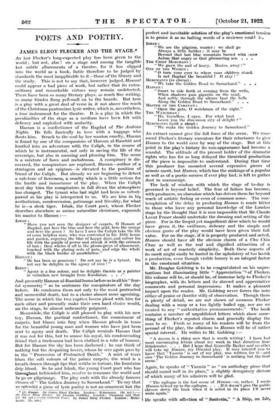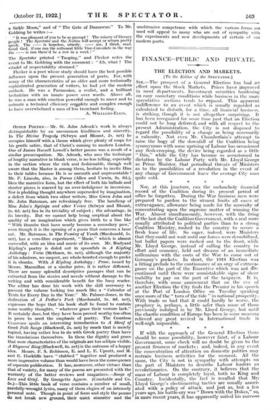POETS AND POETRY.
JAMES ELROY FLECKER AND THE STAGE.* AT last Flecker's long-expected play has been given to the world ; but not, alas on a stage and among the tangible but subtle allurements of a theatre, for it has slipped into the world as a book, liable therefore to be judged by standards the most inapplicable to ft—those of the library and the study. This is not to say that, however judged, Hassan' could appear a bad piece of work, but rather that its extra-
ordinary and remarkable virtues may remain undetected. There have been so many literary plays, so much fine writing, so many tirades flung pell-mell on to the boards. But here is a play with a great deal of verse in it not above the reach of the Christmas pantomime lyric writer, which is, nevertheless, a true instrument for the theatre. It is a play in which the peculiarities of the stage as a medium have been felt with delicacy and exploited with audacity.
Hassan is a confectioner of the Bagdad of The Arabian Nights. He falls farcically in love with a baggage who
flouts him. Struck to the soul by her wanton cruelty, Hassan is found by one of the companions of Haroun al-Raschid and hustled into an adventure with the Caliph, in the course of which he is instrumental, not only in saving the life of the sovereign, but also in amusing and pleasing him. The scene is a mixture of farce and melodrama. A conspiracy is dis- covered, the conspirators are captured, Hassan—author of a stratagem and an epigram—is elevated to the position of friend of the Caliph. But already we are beginning to detect
a sub-tone of fierceness, a cruelty which is a little serious for the bustle and insouciance of the play. When the Caliph next day tries the conspirators in full divan the atmosphere has changed. The tyrant who last night bad been so velvet- pawed at his play is interpreted to us. We see him in his aestheticism, condescension, patronage and frivolity, for what he is—a sleek tiger. Ishak, the Court poet, whom Flecker describes elsewhere as anima naturaliter christiana, expounds his master to Hassan --
Istux :
" Have you not seen the designer of carpets, 0 Hassan of Bagdad, put here the blue and here the gold, here the orange and here the green Y So have I seen the Caliph take the life of some helpless man, who was contented in his little house and garden, enjoying the blue of happy days, and colour his life with the purple of power and streak it with the crimson of lust : then whelm it all in the gloom-greys of abasement, touched with the glaring reds of pain, and edge the whole with the black border of annihilation."
HASSAN : " He has been so generous ! Do not say he is a tyrant. Do not say he delights in the agony of men ! "
Isuen : "Agony is a fine colour, and he delights therein as a painter in vermilion new brought from Kurdistan. . . ."
And presently Haroun al-Raschid burns before us in all his " fear- ful symmetry " as he sentences the conspirators of the day before. He condemns them not only to the most protracted and unmerciful death, but to a choice almost more agonizing. The scene in which the two captive lovers plead with him for each other and presently make their own bard choice would, on the stage, be almost unbearably poignant.
Meanwhile, the Caliph is still pleased to play with his new toy, Hassan, the poetical confectioner, the connoisseur of carpets, but blazes into fury when Hassan pleads in tears for the beautiful young man and woman who have just been sent to agony and death. The Caliph reminds Hassan that it was not for this, but to amuse his royal, his condescending friend that a tradesman had been clothed in a robe of honour. But for Hassan the sky has been darkened ; he can think of nothing but the despairing lovers, whom he sees again pass by in the " Procession of Protracted Death." A mist of tears blurs the soft colours of the palace carpets, the wind is a breath drawn through lips that writhe in torture, the fountains drip blood. So he and Ishak, the young Court poet who has throughout befriended him, resolve to renounce the world and to go on pilgrimage. The play ends with the already famous climax of " The Golden Journey to Samarkand." To say that so splendid a piece of lyric poetry is not an ornament but the
• 0.) Hassan. By Jamea Elroy Fischer. London: Heinemann. [6a. =LI- M) James Elroy nears. By Douglas C:Wring. London: Chipman and Hall. [78. 6d. net.i--(3) Collected Prose. By. James Elroy Flecker. London : Heine- mann. 16s. net.1
perfect and inevitable solution of the play's emotional tension is to praise it as no halting words of a reviewer could Isniur :
" We are the pilgrims, master ; we shall go Always a little further : it may be
Beyond that last blue mountain barred with :mow
Across that angry or that glimmering sea. . . THE CHIEF MERCHANT : " We gnaw the nail of hurry. Master, away ! " ONE OF THE WOMEN :
" 0 turn your eyes to where your children stand. Is not Bagdad the beautiful Y 0 stay ! " MERCHANTS (in chorus): " We take the Golden Road to Samarkand." . . HASSAN: " Sweet to ride forth at evening from the wells. When shadows pass gigantic on the sand, And softly through the silence beat the bells
Along the Golden Road to Samarkand." . . MASTER OF THE CARAVAN :
" Open the gate, 0 watchman of the night." THE WATCHMAN : " Ho, travellers, I open. For what land Leave you the dim-moon city of delight Y " MERCHANTS (with a shova):
" We make the Golden Journey to Samarkand."
An extract cannot give the full force of the scene. We com- mend Flecker's literary executors for their reluctance to give Hassan to the world save by way- of the stage. But at this point in the play's history its non-appearance had become a scandal. The attitude of the present holder of the dramatic rights who has for so long delayed the theatrical production of the piece is impossible to understand. During that time this producer has mounted several expensive pieces of minute merit, but Hassan, which has the makings of a popular as well as of a poetic success if ever play had, is left to gather dust in manuscript.
The lack of wisdom with which the stage of to-day is governed is beyond belief. The fear of failure has become, with producers, an obsession which has driven them far beyond reach of artistic feeling or even of common sense. The con- templation of the delay in producing Hassan is made bitter to those who have any personal knowledge of the London stage by the thought that it is now impossible that Mr. Claude Lovat Fraser should undertake the dressing and setting of the piece. For in the limpid yet magnificent decor which he would have given it, the swiftness, delicacy and the simple and obvious gusto of the play would have been given their full value. For on the stage, if it is properly produced and acted, Hassan should have all the obvious charm of a Chu Chin Chow as well as the real and dignified attraction of a work of art of masterly simplicity. Both these aspects of its merit might easily be buried in the upholstery of too lavish a production, even though visible luxury is an integral factor in the emotional situation.
Mr. Douglas Goldring is to be congratulated on his unpre- tentious but illuminating little " Appreciation "a of Flecker. His volume will be, or should be, of immense help to Flecker's biographer, with its letters and its shrewd and appreciative comments and personal impressions. It makes a pleasant impact upon the reader. Mr. Goldring- never forces the note either of praise or (harder still) of observation. Though there is plenty of detail, we are not shown ad nauseam Flecker dealing with a wasp or a too lightly boiled egg, nor are we treated to any " authoritative pronouncements." The book contains a number of unpublished letters which show some- thing of Flecker's reputed charm and generally display the man to us. Fresh as many of his readers will be from the perusal of the play, the allusions to Hassan will be of rather special interest. He writes to Mr. Goidring :— " A drama is a thing now that is worth writing ! I have had most encouraging letters about my work in that direction from Drinkwater. . . . But I hope that Granville Barker and no other will take up Hassan, my Oriental play. It may interest you to know that Yasmin ' is out of my play, was written for it—and also The Golden Journey to Samarkand ' is nothing but the final scene."
Again, he speaks of " Yasmin " as " an anthology piece that should sound well in its place," a slightly derogatory dictum of which many of his admirers will be glad.
" The epilogue is the last scene of Ilassan—or, rather, I wrote Hassan to lead up to-the epilogue. . . . If it doesn't give the public shivers down the back when it is acted in its place I'll never write again."
He speaks with affection of " Santorin," " A Ship, an Isle,
a Sickle Moon," and of " The Gate of Damascus." To Mr. Goldring he writes :-
" It was pleasant of you to be so prompt ! The misery of literary people ! The Spectator and the Nation will accept or return pretty quick. The — is hopeless, utterly. — are, I think, mad. Good God, if one ran the rottenest little Vice-Consulate in the way the — is run there'd be a row in a week ! "
The Spectator printed " Taoping," and Flecker notes the event to Mr. Goidring with the comment : " Eh, what ? The
citadel of respectability stormed."
Flecker is a poet whose study should have the best possible influence upon the present generation of poets. For, with many of the characteristics of an older and more technically sophisticated generation of writers, he had yet the modern outlook. He was a Parnassian, a realist, and a brilliant technician with an innate power over words. Above all, he was a man with emotion powerful enough to move and to animate a technical efficiency ccasplete and complex enough to have overwhelmed a man of less trenchant feeling.
A. WILLIAMS-ELLIS.



































































 Previous page
Previous page